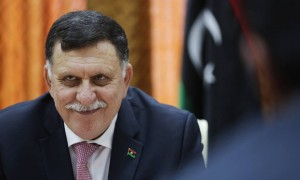By Sami Zaptia.

London, 19 January 2021:
The decision by Libya’s internationally recognized Libyan prime minister, Faiez Serraj, to create the new security entity, the Stability Support Apparatus, has come in for much criticism on Libyan social media.
The Serraj government did not prepare public opinion for the entity. There was no publicised discussion of it by the Serraj government or the Tripoli House of Representatives.
Serraj power consolidation?
The move has received much criticism on social media as a corrupt, parochial, selfish, unpatriotic move – at the very time the country was trying to unite and prepare for elections. It is seen as the last act of the status quo regime.
It has been interpreted as a possible desperate ‘‘power consolidation’’ move by Serraj. It is seen as an indication of weakness by Serraj as he feels threatened by the progress being made by the Libyan Political Dialogue Forum (LPDF) talks.
This comes with the background of the LPDF Advisory Committee approving two options for the mechanism to choose Serraj’s successor and a successor to his failed government. There have been persistent rumours that Serraj has been hatching plans to propose to the LPDF to keep him in power until the 24 December elections.
It may therefore add credence to rumours that he will resist and obstruct being removed by the UNSMIL-brokered LPDF – despite ‘‘resigning’’ in October last year and publicly undertaking to leave office on numerous occasions ‘‘as soon as a new replacement government was agreed’’.
Critics have said Serraj was ‘‘buying’’ the loyalty of two of the main Tripoli militias to possibly use coercive power to keep himself in office.
No rational or justification for the creation of the new Stability Support entity was announced.
Serraj v Bashagha?
The move is also seen as a countermeasure against Serraj’s own Interior Minister and Misratan, Fathi Bashagha.
Bashagha has built a high international and domestic profile for himself and has not attempted to hide his political ambitions for higher office. He has met numerous ambassadors and visited numerous European capitals seeking support in London, Paris and Ankara.
Basagha has the natural backing of strong militia support from his city as well as his Interior Ministry forces. Serraj does not have such natural support.
This is one explanation for why Serraj made the Stability Support Apparatus under his direct control rather than under what logic would suggest would be its natural home, the Interior Ministry.
Bashagha is also seen as a threat by many militias as he seeks openly to reorganize (DDR) them under the direct command of his ministry. These include the two militias whose leaders head the Stability Support Apparatus.
Critics say that Bashagha, irrespective of his political ambition, has made strides in reorganizing the ministry. If Serraj’s honest aim was to improve security and stability, then the reform move would have been conducted under and through the state institution of the Interior Ministry.
Instead, Serraj is muddying the waters by creating a new entity and new layer of security. He is also empowering two already powerful militias and their commanders. He is not contributing to Security Sector Reform (SSR) but obfuscating it.
Serraj is hoping the Stability Support Apparatus will counterbalance Bashagha’s militia and Interior Ministry support. But the jury is out as to whether, when push comes to shove, the Stability Support Apparatus will back Serraj or will switch allegiance and strike an existential deal with whoever the new man/women in power is.
Serraj v Maetig?
Equally, Serraj’s Presidency Council Deputy, and another Misratan, Ahmed Maetig, has politically outmanoeuvred Serraj by pulling out of the proverbial hat, the Maetig-Hafter agreement. The agreement put Libya back on the road to peace by allowing for the resumption of oil production/exports. In return, Tripoli made concessions to the east to achieve reconciliation.
Serraj, however, had publicly vowed never to sit down and negotiate again with the ‘‘war criminal’’ Khalifa Hafter. He felt, with some justification, that Hafter had reneged on previous handshakes and is not to be trusted again.
Effectively, Serraj boxed himself in. Maetig stepped in and outflanked him. This made Serraj look weak (weaker?) and ineffective. Alternatively, it made Maetig look like a man who can strike a deal – even with the enemy. This has made Maetig another strong candidate for the new prime minister. He also has the luxury of the protection of coercive power – militias – from Misrata. Serraj does not.








